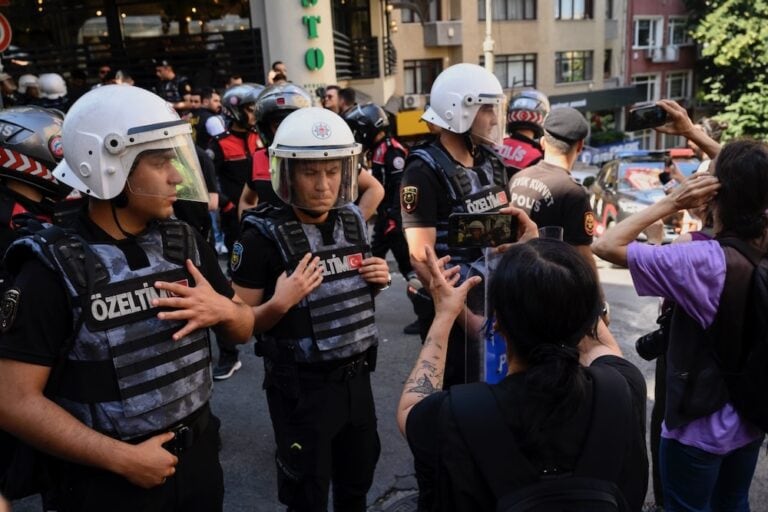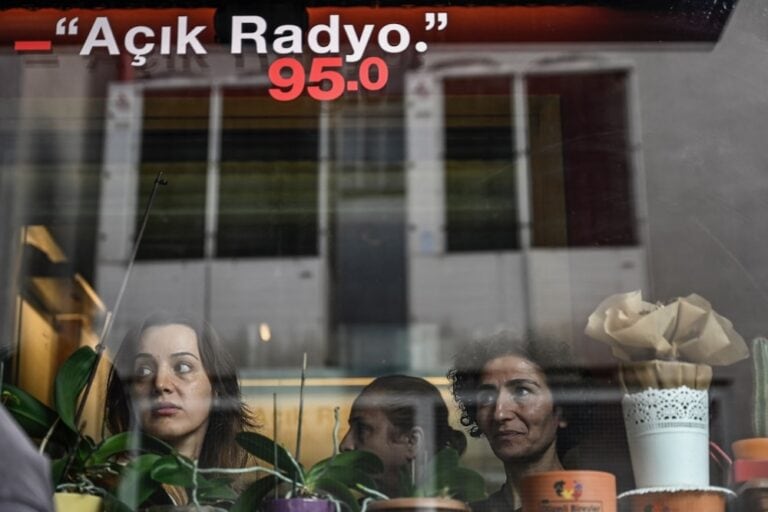(BIANET/IFEX) – “Gündem” journalist Sinan Kara, who has been imprisoned three times before, was acquitted in a trial concerning an article he wrote, in which he joined EU Commission Turkey representative Hans Jörg Kretschmer in criticising the army. The article was entitled “Barracks Party”. The Beyoglu Penal Court in Istanbul decreed that there were “no […]
(BIANET/IFEX) – “Gündem” journalist Sinan Kara, who has been imprisoned three times before, was acquitted in a trial concerning an article he wrote, in which he joined EU Commission Turkey representative Hans Jörg Kretschmer in criticising the army. The article was entitled “Barracks Party”.
The Beyoglu Penal Court in Istanbul decreed that there were “no elements of crime” in the article under Article 301, and acquitted him.
Kara argued during his defense: “My aim was not to degrade the armed forces. The EU was criticising the Turkish Armed Forces’ involvement in politics and I wrote this article because I agreed with that viewpoint.”
However, the journalist’s time in court is by no means over. He is also on trial under Article 301/2 for an article entitled “Justice has become Militarism’s Jester”, published in the “Toplumsal Demokrasi” (“Social Democracy”) newspaper on 20 November 2006.
The article contained the following sentences: “What is saddening is that justice has become militarism’s jester, that the concepts of ‘justice’ and ‘law’ mean ‘injustice’ in this country. Those who are too afraid of taking the general to justice who has engraved himself into our memory as the father of the ‘good kids’, those ‘justice dispensers’ who cannot even come close to punishing the perpetrators of Susurluk, Hakkari, Semdinli, Yüksekova and Diyarbakir, have again started to creep over us like dark clouds.”
Kara was referring to Chief of Staff Yasar Büyükanit’s spontaneous “character reference” for the junior officers accused of bombing a book shop in Semdinli. He called them “good kids”. An attempt by investigating prosecutor Ferhad Sarikaya to investigate Büyükanit and other army members ended in his dismissal from his post and an end to his career as a lawyer.
This second case against Kara opened on 9 January 2007, and the journalist will appear in court again on 26 October.
Kara is also on trial for an article entitled “Full-time killers”, in which he criticised the state and the army in relation to a bombing in Diyarbakir in which 10 people died, eight of them children. Again, Article 301 has been cited, and the case will start on 26 October.
Finally, Kara will face the Istanbul 14th Penal Court on 30 January 2008 for an article entitled “Isolation Knows No Limits”, about isolation cells in prisons.
Published in the “Ülkede Özgür Gündem” newspaper on 14 November 2006, the article says: “It is time you knew that the state is doing whatever it can to ruin these people . . . It has become very clear what kind of isolation the Kurdish people are facing.”
It further says, “First their houses were burnt down; that was not enough. Then they were killed; that was not enough. Then the trees around their homes were burnt down; that was not enough. Then their children were killed; that was also not enough. Now they are trying to leave them in hunger and loneliness.”
Citing Article 216/1, the prosecution is accusing Kara of “inciting hatred and hostility by highlighting regional differences.”
In another case, editor Özlem Aktan and writer Mustafa Temizkan of “Ülkede Özgür Gündem” newspaper are on trial for “praising a criminal” after publishing an article refering to imprisoned PKK leader Abdullah Öcalan as “the leader of the Kurdish People”.
Meanwhile, the Turkish business world has called for a democratisation of the Constitution and penal code. Arzuhan Dogan, the president of the Turkish Association of Industrialists and Business People (TÜSIAD) called for a change in Article 301: “Instead of running after new definitions of secularism, it would be better to let Turkey have a regime which promises modern democracy and full freedom of expression.”


